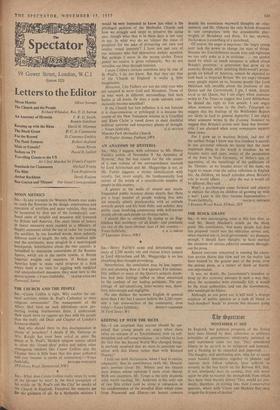KEEPING UP WITH THE R10ES
SIR,—I am surprised that anyone should be sur- prised that young people are angry when there exists an octopus of an Establishment with its self- deception and self-congratulation : its refusal to face the fact that the Second World War changed things. Is anybody surphsed that we want to associate our- selves with Jim Dixon rather than with Richard Hannay?
I held out until Declaration, when I had to realise, reluctantly, that its contributors (with Mr. Donald- son's proviso about Mr. Wilson and his chums) were writers whose opinions I most often shared. With one exception, Mr. Tynan is the only dramatic critic worth reading; Mr. Anderson is the only one of two film critics (and he alone is outspoken in his condemnation of the dreadful films which come from Pinewood and Elstree—an honest concern despite his sometimes wayward thoughts on other matters), and Mr. Osborne the only British dramatist to rate comparison with the considerable play- wrights of Broadway and Paris. To me, anyway, Declaration is something of a spearhead.
Of course, the anger is impotent : the 'angry young men' lack the power to change the state of things. Because the Establishment stands firm and righteous we can only poke at it in criticism . . . we cannot stand by while so much nonsense is talked about Britain's greatness: a generation that grew up in austerity Britain, while imbibing Hollywood's propa- ganda on behalf of America, cannot be expected to look back to Imperial Britain. We are angry because some people expect us to, because people like Lord I-Jailsham talk twaddle about the positions of the Queen and the Government. I vn, I think, deeply loyal to the Queen, but 1 am angry when someone writes to The Times to suggest that Lord Altrincham be denied the right to free speech; I am angry when someone writes to the Daily Telegraph to suggest that the findings Of the Wolfenden Report are likely to lead to general depravity; I am angry when someone writes to the Evening Standard to suggest that Britain's action over Suez was honour- able. I am alarmed when some newspapers support these views.
For I grew up in wartime Britain, and one of the earliest things 1 knew was that freedom is sacred; in our grammar schools we learnt that the most important thing in the world is freedom. As we became more and more aware of the persecution of the Jews in Nazi Germany, of Hitler's acts of aggression, of the bumblings of the politicians of the Thirties: as we became aware of the facts, we began to resent even the palest reflection in English life. As children, we heard speeches about Britain's role in world affairs . . —after the war it would all be different, they said. . . .
Won't a psycholOgist come forward and attempt to explain the effect on children of growing up with a war? Later in life they become hypersensitive.-- I Rennets Wood Road, Eltham,,S'E9


































 Previous page
Previous page